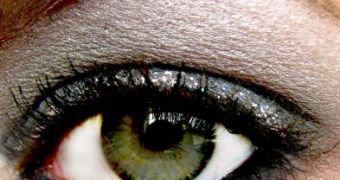Eye cancer is quite a rare disease that can be treated with radiation, and one scientist found a revolutionary way of preventing patients from going blind.
Scott Oliver, MD, assistant professor at the University of Colorado School of Medicine, found out that applying silicone oil inside the eye, can block up to 55 percent of harmful radiation and prevent blindness in most people.
“If you get diagnosed with eye cancer you want to know, `Is this going to kill me? Is this going to make me go blind?'” said Oliver, director of the Ophthalmic Oncology Center at the Rocky Mountain Lions Eye Institute on the University of Colorado's Anschutz Medical Campus.
“I believe this treatment will allow you to keep your eye and keep your vision,” he added.
The common way of treating eye cancer is by using a technique called brachytherapy, which consists of attaching a gold cap with radioactive seeds to the white part of the eye.
For the next week, the radiation burns out the tumor, but unfortunately also damages the eye.
“Radiation injures blood vessels and nerves in the back of the eye, and half of all patients are legally blind in three years in the treated eye,” explains Oliver.
He focused on choroidal melanoma of the eye or uveal cancer, which is the most common and dangerous form of a disease that affects over 2,000 people each year.
It can spread rapidly to the liver and lungs and be fatal, and it is believed to be caused mainly by fair skin and sun exposure.
Oliver carried out several experiments with substances that might block the radiation and also let it affect the tumor and he discovered that silicon oil could do the job.
“You don't have to block out all the radiation to protect the eye because the vital structures in the eye can tolerate low doses of radiation,” he said.
After experimenting on cadaver eyes and on animals without any serious side-effects, he hopes to be able to embark on a clinical trial now.
“This is a significant development in the way we treat this disease [as] in the past, we could save the eye with radiation but we saved vision only half the time.
“With this treatment, I believe we will do much better in the future.”
His findings are published in the July issue of the Archives of Ophthalmology, e! Science News reports.

 14 DAY TRIAL //
14 DAY TRIAL //